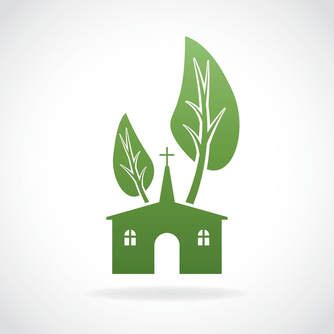 Garden Stories: Careful What You Pray For James 5.7-11 What more can you tell us, you ask me, as I move to the second sermon in this series that could just as well be titled, Things That I Have Learned Sitting at the Foot of John Glover. Well, over the years, John has told me a half-dozen times that it is best to be careful about what you ask for. The advice surfaced again early this summer after we had planted the Season of Faith garden. We hit an immediate dry spell, so I was fretting about all the young sprouts that had fought through the ground. They were young, fragile, without much in the way of root systems. As a result, they were forever wilting. In the city, we would know what to do – turn on the sprinkler. And we actually had a hose and a sprinkler running from a faucet coming out of a well next to the garden. But you will understand that that is a lot of watering for a garden that is 40 acres . . . er, a fourth of an acre. Whatever, John is used to farming hundreds of acres, and for the most part, it just won’t work to go to Lowe’s and get garden hoses. No, when you are farming over against gardening, you have to irrigate the old-fashioned way – by imploring the Almighty to help. Which is what some of us were doing. There were all the bad jokes about how the preacher has connections with the good Lord and therefore should take responsibility for getting some rain. And one Saturday morning, I laughingly made the promise: I guarantee we will have rain . . . by Tuesday. Our Secretary of Agriculture cringed. He said, Slow down, Preacher! I looked his way, and he was shaking his head. My daddy told me a long time ago that a dry July can hurt you, but a wet July can ruin you. I thought about his words of caution after Hurricane Florence dumped ten inches of rain on us. I went out to the garden to try to pick the last eggplants and okra, but I had to sink into the mud a half-dozen inches to get to them. The wind and rain had pretty much demolished everything, even the pumpkins we were hoping to harvest this fall. And yes, it was a wet September, not July, but John’s point stood out nonetheless. You think you want rain? Be careful. And life its ownself regularly furnishes us ample proof that we may not be able to discern what would be good for us. Fortune Magazine tells us that the Certified Financial Planner Board of Standards says nearly a third of lottery winners declare bankruptcy—meaning they were worse off than before they became rich. Other studies show that lottery winners frequently become estranged from family and friends, and incur a greater incidence of depression, drug and alcohol abuse, divorce, and suicide than the average American. (http://fortune.com/2016/01/15/powerball-lottery-winners) It might lead one to conclude that maybe wealth is not all it is cracked up to be . . . or fame . . . or big careers . . . or whatever it is that we fall asleep at night dreaming about. Perhaps we do well to distinguish here between praying and wanting. The Gospels record Jesus as assuring us that if we believe we will receive what we are praying for, we will indeed receive it. I have seen enough unanswered prayers to have my doubts though, of course, it could be that caveat – maybe people fail in prayer because they don’t really believe. Or maybe it is that other condition that Jesus is recorded saying elsewhere – that God gives good things to those who ask, suggesting that there needs to be a rightness, a wholeness, to what we are asking for. Or perhaps we do not have to distinguish between our prayers and those things we ask for in other ways. Ask for rain/pray for rain – I think John’s caution may apply to either. But let’s move to get on point for today seed which is sprouting in our church’s life. What is it that we want? What are we asking for God to create in our life together here at Tarboro and Vance? Well, here – and all the other places where I have been part of church as a minister or a lay person – I have heard church members talk about what they want for the church. Mostly, it has been to grow. Occasionally, someone has probed that ask: why do you want the church to grow? At times, someone has been able to articulate a sense of evangelistic calling . . . of bringing others closer to God. But sometimes, the rationale for growth has been more awkward: to pay the bills . . . to replace members who have moved or died or gone to care facilities. Sometimes, the reason for wanting growth has been to put some people in the pews so the sanctuary won’t seem empty. (It is like going to a movie and there are only 5 other people in the theater – it is weird. When the bad guy jumps out, there is no angst or energy around us.) Maybe it is fair to ask how self-serving some prayers sound in the ear of God. And here is the other thing – and I am fairly sure you have witnessed this as well from time to time. Sometimes, the church will experience a growth spurt . . . but what often follows is some irritation at what those newcomers are doing and saying. I arrive some Sunday morning half-way through the first hymn – just like I always do – and somebody is sitting in my pew . . . the very pew that I have been sitting in since I graduated out of the nursery. What’s going on here? Nothing can evoke the language of we and they like the arrival of some new folks. I want the church to grow! Well, be careful what you ask for, because if God sees fit to answer that prayer, then everything I love may get another look: music . . communion . . . video screens in the sanctuary . . . the translation of the Lord’s Prayer . . . the time of the worship services. Everything. Of course, numerical growth is not the only thing to ask for our church. Maybe it is to become a launching pad for service to our community and the world. Maybe it is to be a well where spirits are nourished and lives are refashioned. Maybe it is to become a place of intellectual depth where people can raise questions and hear more than just the pablum of religious words. Maybe it is something that no one but you has thought of yet but which could transform lives. But whatever you ask for with respect to First Christian Church, be careful. Be careful. And maybe when we think it through, what we should really ask for is nothing . . . just for God to keep things like they have always been. Yes, that would be the safest thing to ask for. Because if we ask for something more, any answer will come with a whole set of demands of us. For sure, the sprouting and growth is God’s miracle, but there is still much for us to do – the weeding . . . the fertilizing . . . the watering . . . the harvesting. We can’t ask and then sit back and watch. We can’t ask and then say, But I’m too old or I’m too young or I’m too busy or I’m too whatever. Our theme is sprouting. And maybe we should have thought about it more carefully before we chose this theme that if taken seriously will demand so much of us. We should be surprised. He told us – if we wanted to follow him, it could only be by going all in. Loving him above all else. With all our hearts and strength. What do you want for First Christian Church? Just be careful how you answer that question. Be careful what you ask for. A sermon preached by Gary L. Walling to the congregation of First Christian Church of Wilson, North Carolina on October 7, 2019.
0 Comments
 I got an email a couple of weeks asking my thoughts about the ways that lay people are “knowingly/unknowingly contributing to the decline within the local church.” This colleague, who is writing a book, was asking a number of ministers to offer their initial thoughts. A follow-up email this past week suggested that the laity has lost its sense of hospitality and are not welcoming people who are different. I decided to weigh in. I stood up for you. You are welcome. First, I said that while there is probably plenty to blame on laypeople, it strikes me that there is plenty of fault to go around – including the failings of ministers and the atmosphere in the larger culture. Second, I said that it is not clear to me that churches which are less open to a diversity of visitors are suffering over those churches that are highly welcoming. In fact, these last two churches that I have served seem to me to be more welcoming than most in the community . . . welcoming of people who are diverse in race, sexual orientation, and economic status and who are differently-able. It has not been clear to me that such openness has made these churches more popular than many neighbor congregations. Don’t get me wrong – I am all in on diversity and hospitality and openness. It is just that some things you do because they are right and godly, not because they offer a competitive advantage. (I also suggested that because a more pluralistic society is where our country is headed, I believe that in time most churches will become more accepting and welcoming of people who are “different”. . . because, in time, those people will come to be seen as not different at all.) I wrote much more to my friend, but one other observation I offered was that even the way we tend to formulate the question is problematic. To be asking what is causing the decline in churches is to subtly suggest that churches deserve to exist and flourish as what they have been. The point is that if there is one thing that laypeople – and ministers, as well – do to turn-off people, it is probably the way that we cling to existing structures. Those of us in church tend to love the church we have known much more than the newcomers do. Now, let me get to the point I want to put to all of you. We seem to be in agreement that we like worshiping together. We get to see everyone when we are in one service . . . the mass of people is greater . . . there is more energy . . . there is an efficiency, especially with respect to staff time and building set-up. For all those reasons and more, I hear us saying we should move back to one service. But then, the wrestling starts: I like a less formal setting . . . with an earlier time, the day opens up for other activities . . . I am afraid we will lose guitars . . . I am afraid we will lose the pipe organ . . . if we stay at 10am, Sunday School is too early . . . if we move Sunday School, when would we count money? And so on and so on. Change is hard. Curiously, it has occurred, our decision probably would be easier if we were starting a brand-new church – there would be no history to guide or restrict us. We had a listening session a few weeks ago and decided to extend the single 10 o’clock service through this month, promising to gather again. And so we shall: Wednesday, October 10th at 6pm. It may be less a listening session and more a push to find the way we will follow for the rest of the year. So, come join us. But bring a spirit of openness . . . and trust . . . and adventure. We can do this. We CAN make this work, God bless us. Blessings and Peace, Gary #ccdoc #ncdisciples #fccwilsonnc #churchgrowth #wecandothis #grow #sprout #ourseasonoffaith #unity #weareone #welcometoourfamily #wilsonnc |
Authors
These thoughts and reflections come from our Senior Minister, Minister of Music and Board Chair. We hope that they provide both challenge and inspiration for your spiritual life. Archives
July 2024
Categories
All
|
#FCCWILSONNC
A Disciples of Christ Congregation located in Eastern North Carolina
207 Tarboro Street North | Wilson, NC
Corner of Vance & Tarboro Streets
252-237-4125
Updated: July 17, 2024 | 9:45am
A Disciples of Christ Congregation located in Eastern North Carolina
207 Tarboro Street North | Wilson, NC
Corner of Vance & Tarboro Streets
252-237-4125
Updated: July 17, 2024 | 9:45am
Proudly powered by Weebly


 RSS Feed
RSS Feed
